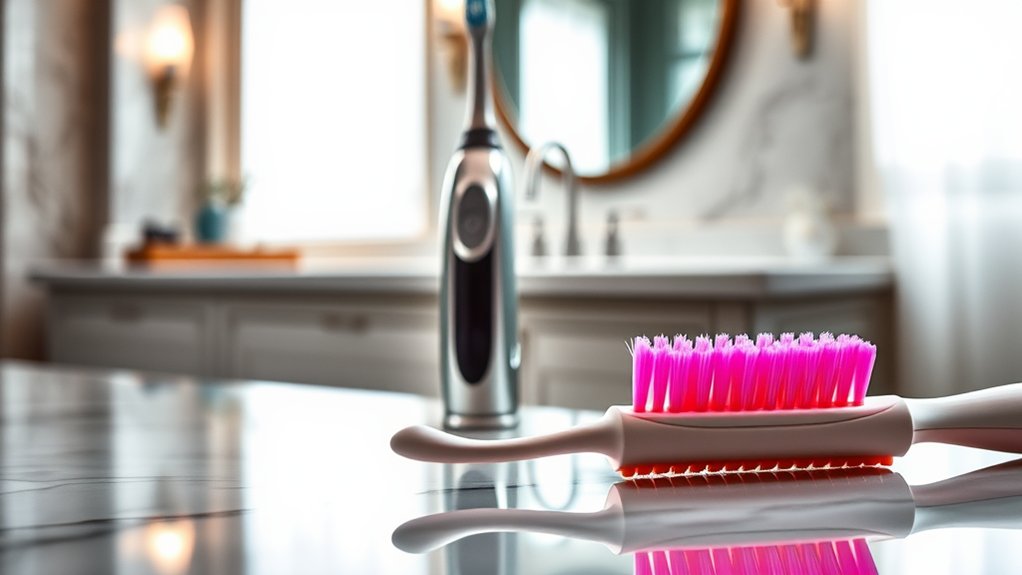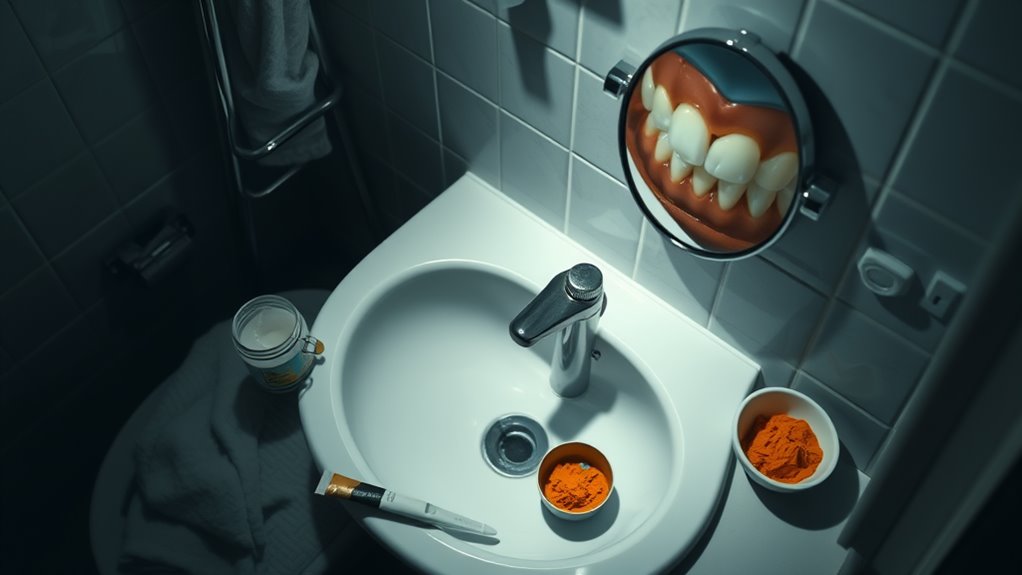Electric vs. Manual Toothbrushes- Which Wins.
Did you know that studies show electric toothbrushes can remove up to 21% more plaque than manual ones? This statistic highlights the ongoing debate about which type of toothbrush offers the best oral hygiene. While electric models boast advanced technology and features, manual brushes have their own set of advantages. Understanding these distinctions is essential for making an informed choice tailored to your personal needs and preferences. What factors will influence your decision?
Key Takeaways
- Electric toothbrushes are more effective at removing plaque and reducing gingivitis thanks to advanced cleaning technologies.
- Manual toothbrushes are cost-effective and allow for greater control during brushing, which can improve technique.
- Electric models often include features like timers and pressure sensors to enhance brushing quality and protect oral health.
- Replacement costs for electric toothbrush heads add to long-term expenses, while manual brushes are cheaper to replace.
- Environmental impact favors manual brushes; they are typically biodegradable, while electric brushes contribute to plastic waste.
Effectiveness of Electric Toothbrushes
Numerous studies have shown that electric toothbrushes can significantly improve oral hygiene.
In a toothbrush comparison, researchers often find that electric models remove more plaque and reduce gingivitis more effectively than manual options. The oscillating and rotating technology in many electric toothbrushes helps you cover more surface area, ensuring a deeper clean.
Additionally, these toothbrushes often come with built-in timers, encouraging you to brush the recommended two minutes. With features such as pressure sensors that protect teeth and gums, electric toothbrushes provide an extra layer of care for your oral health.
If you’re looking to enhance your oral care routine, an electric toothbrush may be your best choice. By investing in one, you’re potentially elevating your dental health substantially.
Advantages of Manual Toothbrushes
Manual toothbrushes offer a cost-effective choice for maintaining oral health, as they typically have a lower upfront cost than electric models. You also gain a sense of control and precision when brushing, allowing you to focus on specific areas of your mouth. This hands-on approach can enhance your brushing technique, ultimately contributing to better dental hygiene. Additionally, incorporating daily flossing into your routine can target spaces that brushing alone may miss.
Cost-Effective Choice
While many people are drawn to the technology of electric toothbrushes, opting for a manual toothbrush can be a cost-effective choice. Manual toothbrushes typically cost a fraction of electric models, with prices ranging from just a couple of dollars to around ten. They require no batteries or charging, eliminating long-term costs.
Studies show that both types, when used correctly, can effectively clean teeth and promote oral health, making manual options a practical solution for budget-conscious individuals.
Additionally, replacing a manual toothbrush every three to four months is easy and inexpensive, ensuring consistent oral hygiene without breaking the bank.
Control and Precision
When it comes to oral hygiene, having control and precision can significantly impact your teeth cleaning routine.
Manual toothbrushes let you determine the amount of pressure, angle, and technique, allowing for a customized approach to your brushing. You can focus on specific areas, ensuring plaque removal where it matters most.
Research shows that hand-eye coordination improves your cleaning efficacy, as you control every movement. Moreover, you can adapt your motion based on comfort and sensitivity, minimizing the risk of damage to gums or enamel.
This hands-on method empowers you to take charge of your dental health effectively and confidently.
User Experience Comparison
When considering user experience, ease of use plays a crucial role in choosing between electric and manual toothbrushes.
Many find that electric toothbrushes simplify the brushing process, while manual brushes require more effort and technique to achieve effectiveness.
Additionally, research shows that electric brushes often provide superior cleaning efficiency, potentially leading to better oral health outcomes. Moreover, features like pressure sensors in electric models help prevent aggressive brushing, enhancing the overall experience and oral care.
Ease of Use
Many people find that electric toothbrushes offer a more user-friendly experience compared to their manual counterparts.
Here are some reasons why you might prefer electric toothbrushes for ease of use:
-
Automated Brushing: They do the brushing for you, minimizing effort.
-
Timers: Built-in timers ensure you brush for the recommended two minutes.
-
Multiple Settings: You can adjust modes for sensitive gums or different cleaning needs.
-
Ergonomic Design: They often feature comfortable grips, reducing strain on your hands.
Ultimately, the convenience and supportive features of electric toothbrushes make them an appealing choice for everyday dental care.
Cleaning Efficiency
While personal preferences play a significant role in choosing a toothbrush, the cleaning efficiency of electric toothbrushes typically surpasses that of manual options. Research shows that electric brushes can remove up to 21% more plaque than manual ones, thanks to their rapid bristle movement.
You might notice better gum health after consistent use, as electric models often feature timers to ensure adequate brushing time. Additionally, many electric toothbrushes come with pressure sensors to prevent you from brushing too hard, which can harm your gums.
In contrast, manual brushes require more effort and technique to achieve similar results, making electric alternatives advantageous.
Cost Analysis of Both Options
Although the initial investment might seem daunting, analyzing the long-term costs of electric and manual toothbrushes reveals significant differences. Here’s a breakdown to consider:
-
Initial Cost: Electric toothbrushes range from $20 to $300, while manual ones typically cost between $1 to $5.
-
Replacement Heads: Each electric toothbrush head costs about $5-$10, usually replaced every 3 months.
-
Durability: Electric brushes can last several years; manual brushes need replacement every 3-4 months.
-
Oral Health Costs: Better cleaning with electric brushes may lead to fewer dental issues, reducing long-term healthcare costs.
Making an informed choice matters for your wallet and oral health.
Environmental Impact
When considering your toothbrush choice, it’s essential to assess the environmental impact of both electric and manual options.
Manual toothbrushes are generally more eco-friendly, as they’re made from biodegradable materials and don’t require batteries or electricity.
On the other hand, electric toothbrushes often contain plastic components and batteries, which contribute to waste and pollution. However, some manufacturers are working on recyclable models.
Additionally, electric toothbrushes may lead to fewer replacements, potentially balancing out their carbon footprint.
Consider how long your toothbrush lasts and the materials used when making your decision to minimize your environmental impact.
Long-term Oral Health Benefits
The choice between electric and manual toothbrushes can also impact long-term oral health benefits.
Selecting the right toothbrush could mean the difference between maintaining healthy gums and preventing tooth decay. Here are four important benefits to consider:
-
Better Plaque Removal: Electric toothbrushes typically remove more plaque than manual ones.
-
Enhanced Gum Health: Users often experience improved gum health with regular electric brush usage.
-
Consistent Technique: Built-in timers help ensure you brush for the recommended two minutes.
-
Reduced Risk of Cavities: Effective brushing leads to a lower risk of cavities over time.
Additionally, maintaining good oral hygiene can support overall health by reducing inflammation linked to conditions such as heart disease and diabetes.
Choosing wisely ensures a healthier smile for years to come.




